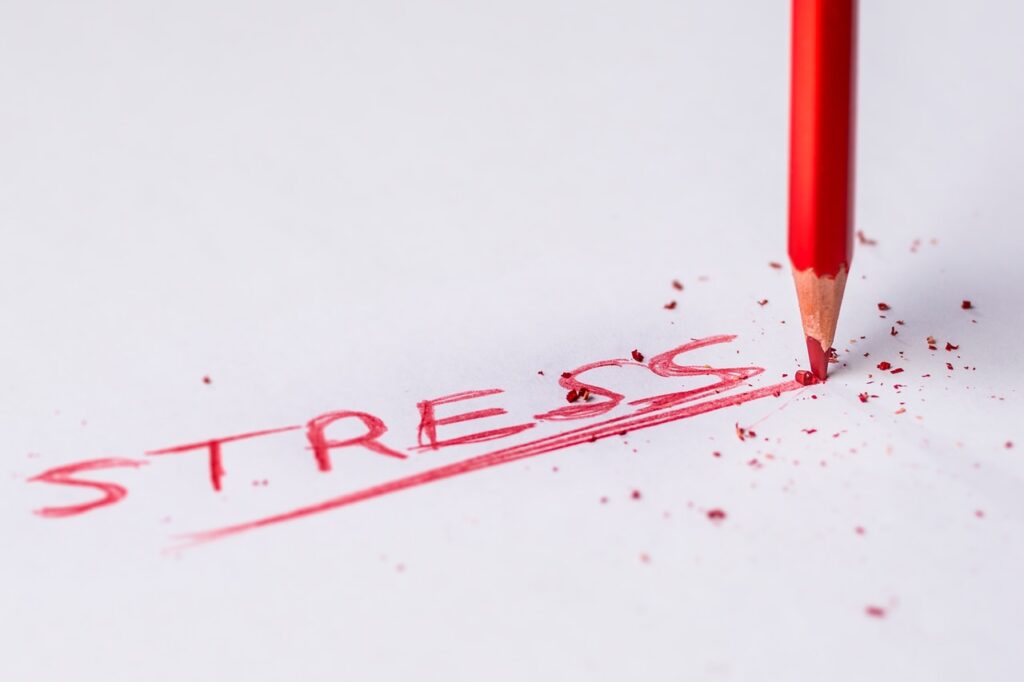How Stress and Anxiety Cause Insomnia – Take it from me; I’ve suffered from insomnia caused by stress and anxiety before and let me tell you, it is not pleasant. Your mind races and you can’t stop thinking about all the things that are stressing you out, keeping you awake, and even making you feel nauseous in the process! It’s no wonder that stress and anxiety lead to more doctor visits than any other health condition — but what are some natural remedies to try before calling your doctor? Read on to find out some of my favorite stress-reducing tips that can help your insomnia caused by stress or anxiety…
The short-term effects of stress
stress can have short-term effects on your sleep pattern. When you’re anxious, it’s difficult to fall asleep; but if you do fall asleep, it’s a restless sleep. Generally speaking, stress interferes with your ability to both falls asleep and stay asleep; stress also tends to make you tired throughout the day. You might think of your body as one big energy bank that gets depleted from use over time—and after periods of stress or anxiety, your body can remain in the high-anxiety mode for quite some time. Because of these factors, insomnia caused by stress is often temporary. The effects will wear off once your mind and body recover from being overly stressed out. However, it is possible for stress to cause more lasting damage to your sleep cycle than just temporarily interrupting your sleep schedule. That’s why it’s important to learn how to manage anxiety so that it doesn’t interfere with healthy sleeping habits!

The long-term effects of stress
What’s worse is that it can lead to long-term effects, such as an increased risk of high blood pressure, heart disease, headaches, and even diabetes. (Source: Mayo Clinic) It can cause insomnia. Have you ever wondered why you keep waking up at night? When we are feeling stressed out our sleep habits change dramatically. We wake up throughout the night because we toss and turn too much. More than likely you’ll get less than 5 hours of sleep if you’re under a lot of stress! This greatly affects your overall health and well-being as lack of sleep decreases your ability to focus on tasks during your day which could make work or school more stressful. Having trouble sleeping at night isn’t only annoying but it’s also bad for your health. The short-term effects of stress and anxiety aren’t great either – so if you find yourself suffering from insomnia caused by stress then try these quick tips below.
Types of Insomnia
There are different types of insomnia, which can be broadly classified according to how the person is trying to fall asleep.
- Normal/everyday insomnia: This is when someone cannot sleep even if they try hard and have a bedtime routine that works for them. It’s usually because there are unresolved mental or emotional factors that are keeping them up at night.
- Insomnia caused by stress: If you’re having trouble falling asleep or staying asleep, and it’s not related to everyday occurrences such as jet lag or your cat snoring, you may be suffering from insomnia caused by stress. The unwelcome intrusion of stress can generally make bedtime more difficult for anyone put into an uncomfortable situation that causes the body-mind system to go on high alert. Stressors may include job pressures, overwork, relationship troubles, etc.
- Insomnia with sleep problems: Remember in school sometimes you would meet with a teacher who could tell right away when things weren’t going well at home? That’s what it can feel like to have a sleep disorder;
if your bedtime routine is working but you’re still having difficulty sleeping, there might be something wrong or perhaps nothing at all. If yes: see below
Types of Sleep Disorders There are three classes of symptoms that indicate someone has a sleep problem and each class typically covers a variety of different symptoms:
- Major sleep disorders: insomnia, obstructive sleep apnoea (OSA), narcolepsy, and restless legs syndrome
- Significant restlessness or circadian rhythm problems such as shift work disorder at night; periodic limb movement disorder during the day
- Light snoring with more severe daytime arousals than those experienced by people who don’t have trouble falling asleep.
Postpartum Insomnia
After giving birth, it’s not uncommon for sleep to become a challenge. Many factors can contribute to disrupted sleep after childbirth, including breastfeeding and the intense hormonal shift that often follows delivery. Other common postpartum issues include infant colic and teething. If you’re struggling with insomnia after having a baby, there are many things you can do to improve your quality of sleep:
- Make accommodations for breastfeeding: It might be necessary to have a breast pump, use pumping tanks (like the ones used with bottle feedings), or hire someone to assist should you need it.
- Practice safe sleep habits: address the location of your bed/nest and make sure there are no possible hazards in the room that could pose a danger for babies like electrical cords or phones lying on tables near where they sleep
- Establish an alerting system that can be activated when your baby is crying and you need help. If all else fails, try to find a sleep center that offers postpartum support services
- Work with your healthcare provider/midwife to decide on one of the following strategies for managing your symptoms: advance preparations for delivery, contact advanced nursing planned cesarean (ANP), an epidural family involvement, or in-hospital sedation depending on what’s available at this hospital.
PMS and Insomnia
If you’re experiencing severe mood swings and difficulty sleeping, it might be a sign that you have premenstrual syndrome (PMS). Symptoms of PMS can include extreme emotional outbursts, changes in appetite or sleep patterns, and problems with concentration. If left untreated, these symptoms can lead to more serious conditions like depression and anxiety. there are many things that you can do to improve your quality of sleep:
- Make sure to get enough sleep and drink plenty of water
- Establish regular bedtime and naptime routines for your baby to get accustomed to this habit if possible, or at least add a few extra hours of shut-eye by going into the nursery two nights a week until you are home again following delivery. Also, give them healthy snacks before bed so they won’t be hungry when they wake up during their nap in the middle of the night as well as the regular meals for this time.
- Keep your bedtime and naptime routine relaxed, but unchanging to get accustomed to it as quickly as you can so that when something unusual happens during those specific times of day, don’t let it set off another full-blown mental breakdown at night or cause more problems all over again
- Consider enlisting help from a child psychologist if depression or postpartum anxiety is preventing you from getting restful sleep
- Consider seeing a midwife or another trusted health care professional for help with breastfeeding, post-partum depression, or anxiety that might be making you too fussy to fall asleep at night and not eating enough during the day.
How to Sleep When Stressed
There are many things that can cause stress, and it’s impossible to list them all. However, some tips for how to sleep when stressed include:

- Try taking a relaxing bath or shower before bed. This could help you unwind and associate relaxation with bedtime.
- Make sure that your bedroom is dark and quiet so that you can relax without distractions. If possible, try using noise-canceling headphones to block out any external noise.
- It’s okay to stay up late on occasion, as long as you make sure that you get enough sleep during the day before bedtime. If the need for a quick nap is prevalent, then try not taking naps more than once every two or three days.
- Lavender and valerian are both anti-anxiety herbs that can help you relax after a day of stress or anxiety. I do not recommend taking too much at once (often called “loading up”) because it may be very hard to sleep through the soothing aroma coming from your pillow, hairbrush, etc.
- Try having a large glass of wine, but it should be one that you would drink based on the day’s stressors, so try to limit your intake if there has been an argument with family members or partners in the past 24 hours.
- Most importantly: Eat dinner at least three hours prior to bedtime and make sure that this meal is balanced; don’t skip meals altogether as it may have a sleep-disrupting effect 7. Try supplementing a good night’s sleep with melatonin to help relieve stress while you’re trying to fall asleep — it can be purchased over the counter (or even through Amazon).
Most of us are too harried and intellectually stressed during our waking hours not to realize that we have vastly underestimated what we need for optimal mental performance at rest.
Reduce your Stress
Stress and anxiety are often causes of insomnia. The stress hormone cortisol is a stimulant, which keeps us awake for long periods at night. To reduce your anxiety and stress levels so you can sleep soundly again, try these simple steps: Exercise every day—this releases endorphins that improve mood. Practice yoga or meditation—both improve sleep quality. Eat a healthy diet rich in fish, fruits, vegetables, and whole grains—these are anti-inflammatory foods that promote healthy brain function. Research shows that drinking tart cherry juice helps reduce pain too! Talk to your doctor about using an over-the-counter (OTC) sleep aid to get extra help falling asleep at night.
Exercise at the Right Time
Most people don’t think of exercise as a good way to reduce stress, but when done at the right time (even just ten minutes can do the trick), exercise is a great de-stressor. When you are stressed, adrenaline gets pumped into your system causing an increase in heart rate and blood pressure. Exercise helps to burn away the excess adrenaline by raising your heart rate. The extra oxygen being delivered to the brain gives you a surge of energy that helps reduce anxiety symptoms. When combined with breathing exercises, exercise can really help reduce insomnia caused by stress or anxiety. Breathing exercises keep you relaxed while increasing oxygen flow to the brain—which helps provide a quick reprieve from insomnia.

Manage Your Time Better
If you’re having trouble falling asleep or staying asleep, sometimes stress and anxiety are to blame. That’s because your nervous system becomes hyper-stimulated by stressors in your life, such as a new job, relationship problems, financial concerns, or everyday responsibilities. Even positive things like starting a new exercise routine can sometimes cause insomnia. Managing your time better is one of the best ways to reduce insomnia caused by stress and anxiety because it gives you more control over your workload. In addition to reducing stress, managing your time better also helps you get organized and plan ahead so that you don’t find yourself scrambling at work or scrambling to get dinner on the table. Being able to juggle everything that comes with adulting means being able to plan ahead so that you don’t feel overwhelmed when something stressful happens.
Don’t Oversleep
Oversleeping might help you temporarily forget about stressors like work or a struggling relationship, but it can actually lead to more sleep problems down the road. Chronic oversleepers often experience trouble getting back to sleep when they wake up too early. In addition, oversleeping can interfere with your circadian rhythm—the body’s natural cycle that determines when you should be awake and when you should be asleep. To prevent insomnia caused by stress & anxiety, don’t overdo it on sleep.

Meditate in the Morning or Evening
Research shows meditation helps reduce stress and anxiety. Don’t have time to meditate in the morning or evening? An afternoon session might do the trick since it will be easier to fall asleep after you’ve spent a good chunk of time relaxing your mind. If you can carve out some time for each in your schedule, that’s even better. One study found that participants who practiced Transcendental Meditation twice a day for six months had a better self-reported quality of life compared to those who did not meditate at all. The practice is also tied to reduced insomnia severity in people with Parkinson’s disease or chronic pain.

Get enough sleep before going on a trip or other occasion e.g., exams or surgery
While we all know sleep is important, many of us underestimate just how crucial it is to get enough rest. It may seem harmless, but poor sleep hygiene can wreak havoc on your mental health in ways you never imagined. For example, new research has found that not getting enough sleep can dramatically increase levels of a stress hormone called cortisol, which leads to even more anxiety and stress than before. That’s why it’s so important to prioritize your ZZZs before an upcoming trip—or any time you anticipate being stressed out—so you have a better chance of coping with life’s inevitable curveballs.
Take Sleep Supplements
Recent studies show that more than 50% of Americans get less than seven hours of sleep a night, while 30% don’t get enough. Not only is insomnia linked to being tired during your day, but it’s also been shown to cause anxiety, depression, weight gain or loss, high blood pressure, diabetes, and even early death. Sleep medications such as Ambien have been used to reduce insomnia in people with chronic stress or anxiety—but they can also be highly addictive. For those suffering from insomnia because of stress or anxiety, try non-addictive supplements like melatonin instead. You might not go right to sleep after taking them (that usually takes 20 minutes) but they can help you get a restful sleep without addictive side effects.

What to Do When You Can’t Sleep: 8 Tips
- Get up and walk around
- Listen to calming music or natural sounds
- Write in a journal
- Practice relaxation techniques, like deep breathing or progressive muscle relaxation
- Take a hot bath or shower
- Read a book before bedtime
- Try a light sleeping medication if you’re struggling to fall asleep for more than two hours at night without any kind of interruption from noise, motion, light, or even noise, motion, light, and a cup of coffee.
- Pick up your baby and set them in their crib — try rocking or swaying with cradling as you hold onto either shoulder so they are feeling secure while you rock gently to create what’s called “conscious sleep”
The relationship between sleep and mental health
It is no secret that our mental health and sleep are intimately intertwined. Poor sleep can lead to anxiety, depression, and a host of other problems. While it’s obviously not possible to cure or even completely treat mental illness, there are many things you can do to improve your quality of sleep. By following some simple tips and employing the help of a professional as necessary, you can get the rest you need in order to feel your best mentally and physically.
Conclusion
Although dealing with stress and anxiety can be very overwhelming, there are many ways to reduce insomnia when it is caused by stress and anxiety. Even if you don’t want to deal with your anxiety or stress head-on, there are many other things you can do to keep stress and anxiety from interfering with your sleep. Stress-relieving techniques such as meditation, deep breathing exercises, and a hot bath before bedtime may help reduce some of these symptoms. You should always talk to your doctor about how insomnia is affecting your life since there may be underlying issues that need attention. They will also be able to provide insight into which treatments are most likely to work for you as well as what kind of dosage or prescription-strength might work best.
FAQs

What are the benefits of taking a hot bath before bed?
A hot bath can be a relaxing and peaceful way to prepare for bed. Hot baths are commonly associated with reducing stress and promoting relaxation, which has been shown to help improve sleep quality. The warmth from the bath can also stimulate your skin, helping you drift off to sleep more easily.
What is the best type of bath oil to use in a hot bath?
There is no one “right” answer to this question as everyone has different preferences and skin types. However, some popular bath oils that may be good choices for a hot bath include lavender oil, chamomile oil, and rosemary oil. These oils are commonly thought to have relaxant properties and can help you enjoy a peaceful night’s sleep.
Why am I anxious when I’m trying to sleep?
Some people find it difficult to fall asleep because they are anxious. Anxiety can interfere with the body’s natural ability to relax and fall asleep, leading to restless nights. There are a few things you can do to help ease your anxiety before bedtime: try relaxation exercises, practice meditation or mindfulness, avoid caffeine and alcohol close to bedtime, and make sure you get enough rest during the day.
Is technology use now the primary cause of insomnia?
There is no definitive answer as to whether technology use now or in the past is the primary cause of insomnia. However, there are many people who believe that modern lifestyles, with their increased reliance on electronic devices and screens, are contributing to an increase in insomnia rates. This is likely due to the fact that electronic devices can stimulate our brains in unexpected ways and keep us active throughout the night.





